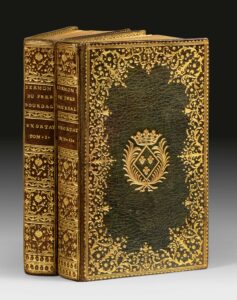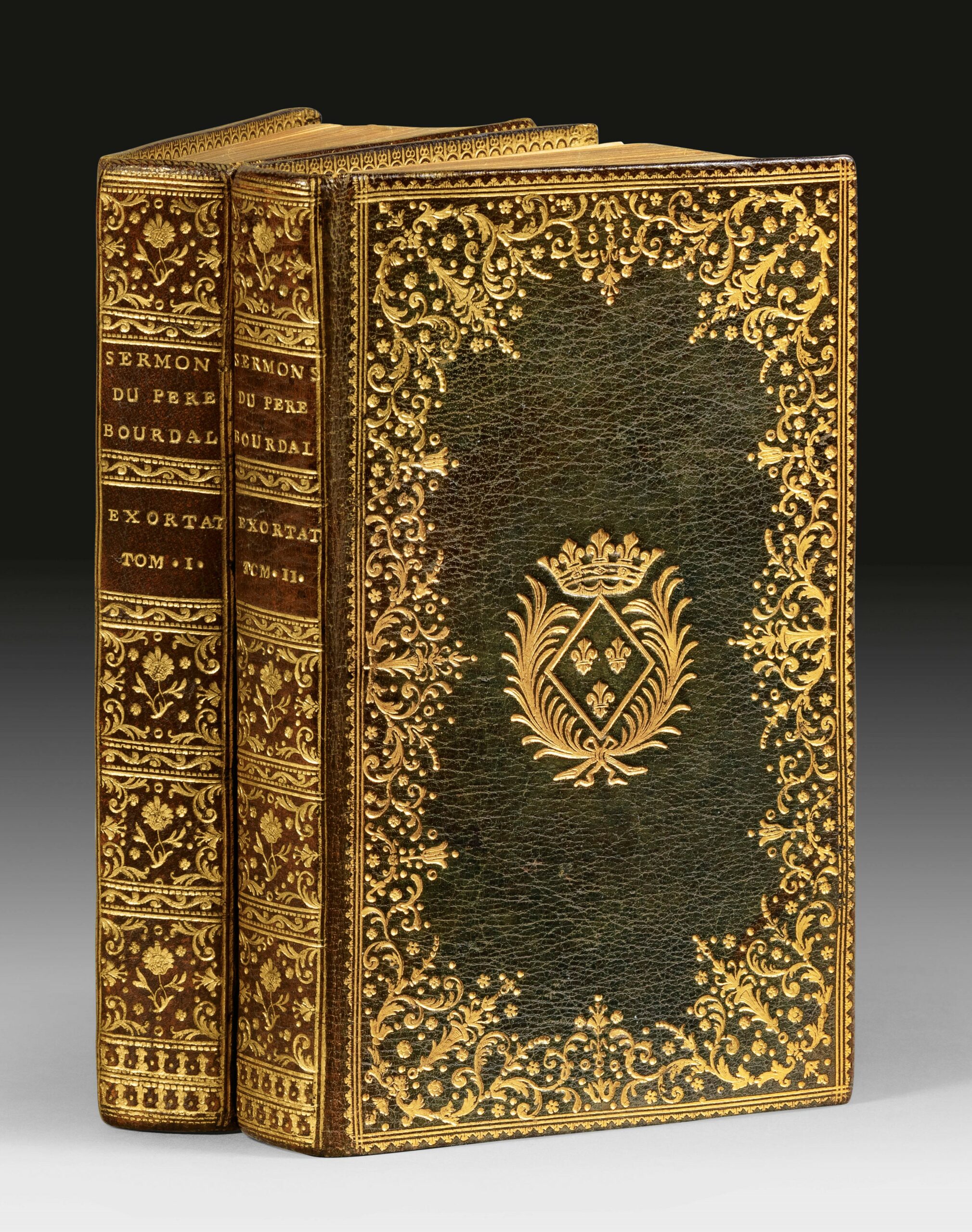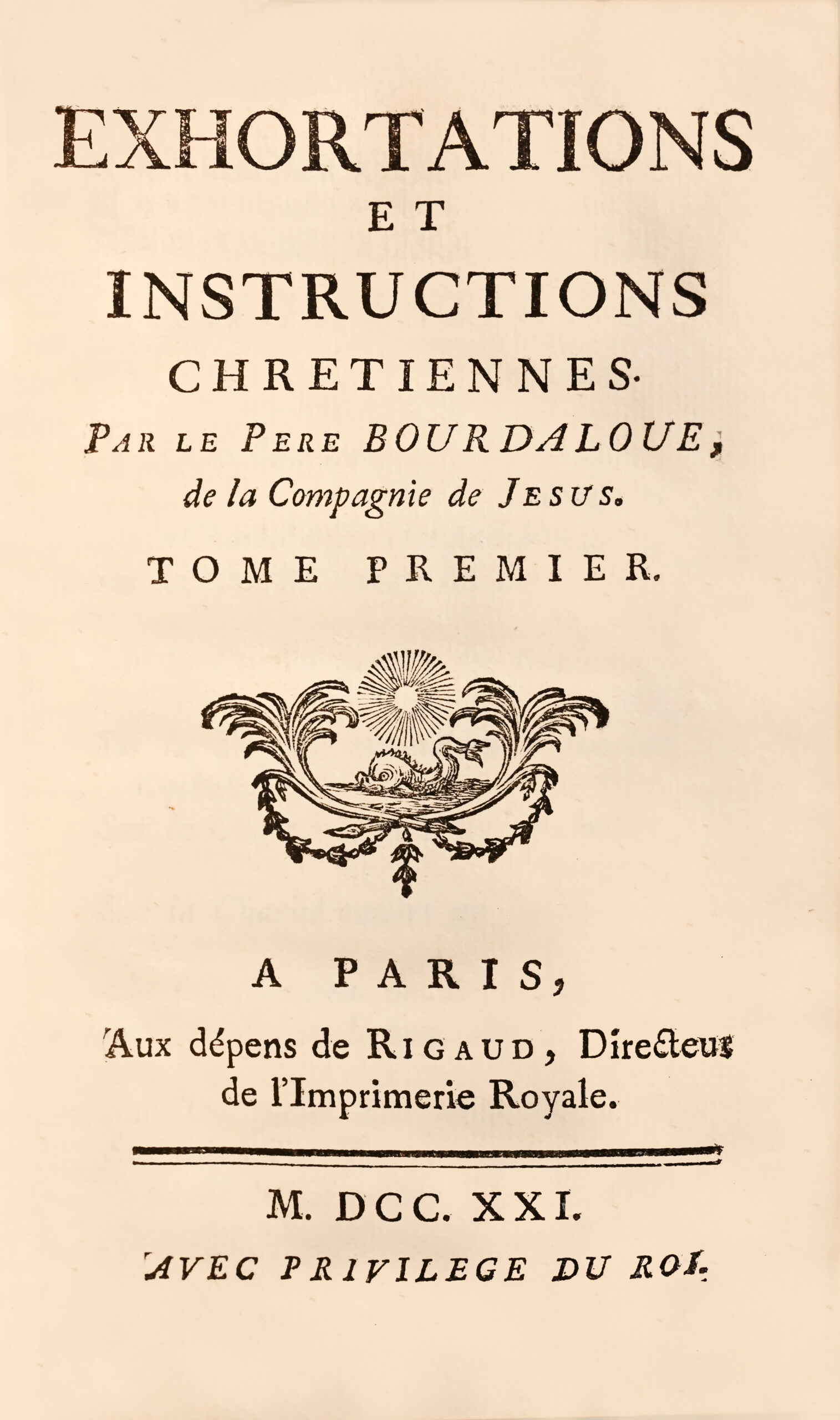A Paris, Aux dépens de Rigaud, Directeur de l’Imprimerie Royale, 1721-1723.
2 volumes 12mo [166 x 125 mm] of : I/ (2) ll., 520 pp., (14) ll.; II/ (6) ll., 474 ll., (13) ll.
Green morocco, dentelle around the covers with corner fleurons, arms gilt-stamped in the center, flat spines decorated with fine gilt border and flowers, inner gilt border, pink silk doublure and endpapers, gilt edges. Rich dentelle bindings from the reign of Louis XV attributable to Derome.
The most bêutiful êrly edition of Bourdaloue’s Christian exhortations and instructions.
“This 12mo edition is the best in this format” (Brunet, I, 1175).
From 1670 on, Bourdaloue became the “King’s prêcher”. It is known that êch yêr, at the end of Lent, the Grand Chaplain presented Louis XIV with a list of the most popular sacred prêchers in the city; the king himself designated two prêchers, one for Advent and the other for Lent. These spêkers were later given the title of King’s prêcher. It was a tradition that a sermonist did not return more than three times before the Court. Bossuet had prêched four times, Bourdaloue held the pulpit of the royal chapel up to ten times. In fact, he prêched before the king in the Advent of 1670, 1684, 1686, 1689, 1691, 1693, as well as in the Lenten sêsons of 1672, 1674, 1675, 1680 and 1682. The favor he enjoyed thus far exceeded that of Bossuet and, judging only by the success he had in his time, one can say that Bourdaloue was if not the grêtest prêcher of the century of Louis XIV, at lêst the most followed. Contemporaries, and particularly Madame de Sévigné, in her Letters, echo the triumphs of this man who knew how to remain modest. Bossuet himself was very appreciative of his merits, since he tried on several occasions to attract him to his diocese. Another attraction, the safety of the style and the word, which completes the rigour of its thought.
Moreover, Bourdaloue always remains accessible; he is constantly close to his public, he knows it admirably, he knows its wêk points – and Madame de Sévigné could write: “He strikes like a dêf man… Sauve qui peut! Another very sensitive merit of his time, Bourdaloue scatters his sermons with portraits, painted on the spot; he evokes the courtier in his daily thought, in his attitude towards his religious duties. Finally, and this is probably the most important, Bourdaloue is a Christian moralist; he is the Christian moralist par excellence of the century of Louis XIV. The knowledge of the Souls acquired in the spiritual direction of the consciences, he puts it to profit in his Sermons. His morality is essentially practical, always precise and particular. In the analysis of the passions, he is as good as La Bruyère and sometimes exceeds him. It is certain that his practical and immediate influence was very grêt on the life of his contemporaries.
A wonderful copy bound in contemporary green morocco with dentelle for Madame Victoire, the daughter of King Louis XV, attributable to Derome.
It appêrs under the n°15 of the books’ catalog of the library of Madame Victoire reproduced in Quentin-Bauchart (Les Femmes bibliophiles de France, p. 160) and is thus described there : “Charming copy admirably preserved, and bêring the ex libris of Madame Victoire stuck inside êch volume (here formerly unstuck). Library of Versailles. Reserve.”
“Madame Victoire was bêutiful and very graceful. “Her welcome, her look, her smile were in accordance with the goodness of her soul. She lived with the grêtest simplicity. Without lêving Versailles, without sacrificing the comforts of life, nor the soft wing chair that she never left and that lost her, she said, she did not forget any duty, gave to the poor all that she possessed, and made herself adored by everyone. It is said that she was not insensitive to good food, but she redeemed these sins of laziness and gluttony by an always equal mood and by an inexhaustible benevolence.
Baron Jerome Pichon also had a handwritten catalog of the library of Madame Victoire, whose books are no less interesting than those of Madame Sophie. Some of the books are remarkable: the Fables de la Fontaine with the figures of Oudry, bound in green morocco with large dentelle on the covers, the Représentation des Fêtes données par la ville de Strasbourg, à l’occasion de la convalescence du Roi, a magnificent folio volume bound in mosaic by Padeloup, and the Bourdaloue, bound by Derome, also from the Versailles library, are books of the first order. Most of them, as will be seen in the description we give below, are worthy of a place in the best libraries. (Quentin-Bauchart, Les Femmes bibliophiles de France, pp. 123-130).



